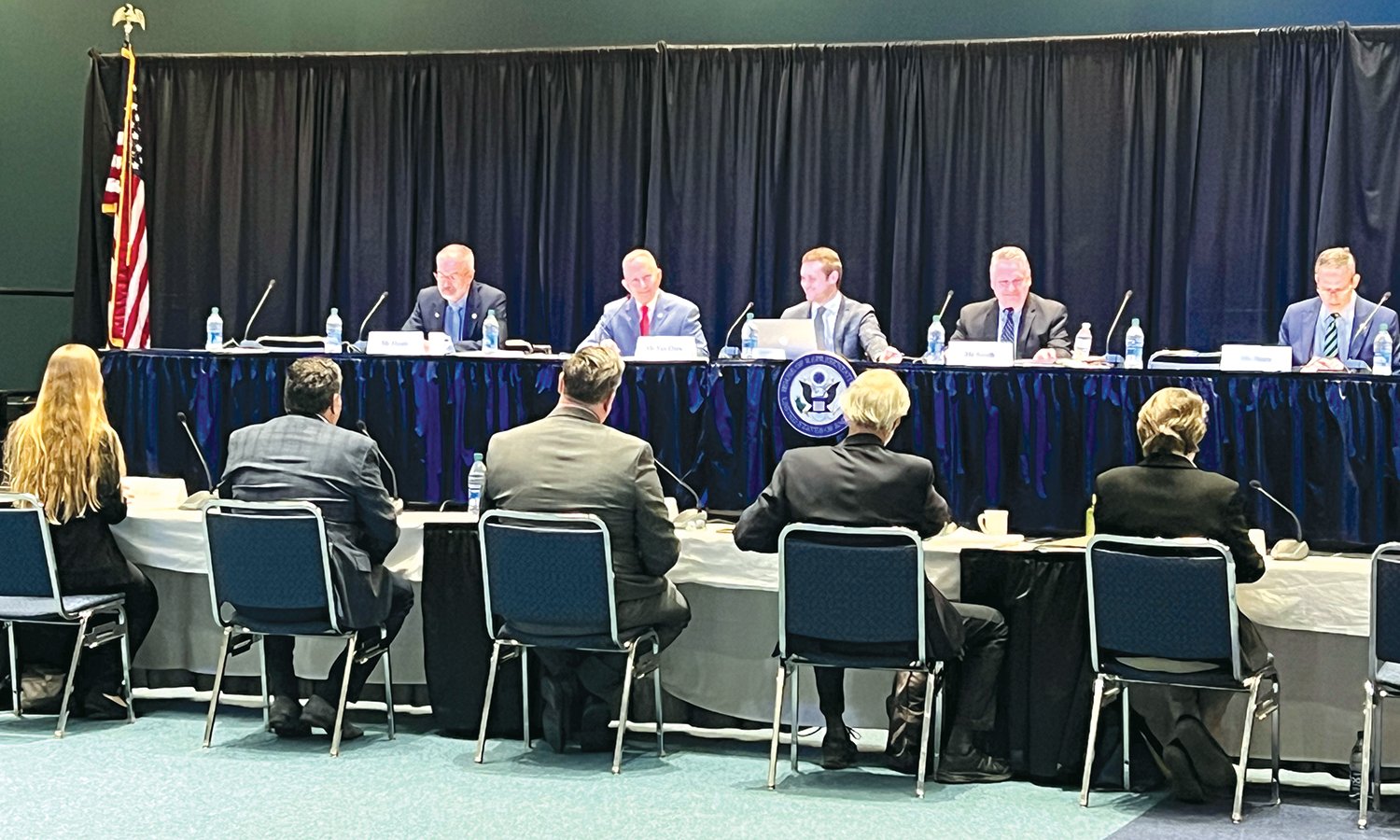
In his opening statement as chairman of the March 16, 2023 Congressional field hearing at the Wildwood Convention Center in South Jersey, U.S. Representative Jeff Van Drew of New Jersey’s second district made clear to the assembled crowd that this was not just an ordinary meeting, but “the launch of a congressional investigation into offshore wind, and we call it offshore wind industrialization.”
Together with fellow New Jersey Congressman Christopher Smith of New Jersey’s third congressional district, along with Rep. Andy Harris of Maryland and Rep. Scott Perry of Pennsylvania, the purpose of the field district hearing according to Rep. Van Drew was to develop a comprehensive legislative solution for the disruptive effects of offshore industrial wind.
There were 400 RSVPs sent in from the public in advance of last Thursday’s event, but twice that number showed up to attend the hearing; only 400 members of the public were allowed into the convention center’s hearing room, the rest prohibited from entering due to the room’s space constraints. As the hearing got underway inside the convention center just a little after 2 p.m., a chant of “let us in” could be heard from out in the vestibule from members of the public not allowed to enter given the space.
While a handful of wide-eyed young wind advocates in Sierra Club t-shirts stood along the boardwalk with signs promoting the global fight against climate change, the vast majority of attendees of varied age welcomed the start of the full-scale investigation into industrial wind along the Jersey Shore and cheered loudly as members of the congressional team pledged to continue the investigation into the relationships between wind energy and government officials.
“If offshore wind industrialization moves forward it will be the most profound transformation of the Atlantic Coast in the history of the United States of America,” Rep. Van Drew stated in his opening, while adding in his closing comments “we have the classic case of big companies joining with big government colluding together…working together, not telling the truth.”
Van Drew later added “The federal government is allowing these offshore wind companies to bypass in-depth analyses of offshore wind farms’ long-term impacts in order to push through this administration’s Green New Deal policies,” while explaining “”It is becoming more and more clear that BOEM (Bureau of Ocean Energy Management) and NOAA (National Oceanic and Atmospheric Administration) are in collusion with these companies, and they won’t be able to hide forever.”
Invited witnesses who spoke before the four members of congress and the crowd of 400 included Cindy Zipf (Executive Director, Clean Ocean Action), Bob Stern (PhD, Former Director, Office of Environmental Compliance at U.S. Department of Energy), Mike Donohue (Former NJ Superior Court Judge), Daniel LaVecchia (Owner, LaMonica Fine Foods), Meghan Lapp (Fisheries Liaison, Seafreeze) and David T. Stevenson (Director, Center for Energy & Environmental Policy at Caesar Rodney Institute).
While mainstream media reporting after the hearing shared numerous criticisms from environmental organizations who were not invited to testify – even as they’re frequently quoted by mainstream news outlets in support of industrial wind – a key corporate figure in much of the wind debate, the Danish energy giant Ørsted, was in fact invited to testify but declined the offer. “I invited Ørsted today,” Rep. Van Drew said during the hearing, adding “Ørsted rejected the opportunity to appear and explain their process.”
Zipf, who spearheaded efforts to ban ocean dumping off the Jersey Coast in the 1980s and has been a staunch 40-year opponent to ocean industrialization efforts at the non-profit Clean Ocean Action, testified that a smaller pilot windfarm project might’ve made more sense than what is being created now. “While some offshore wind may hold promise, federal and state agencies have moved forward without public transparency, robust and sound science and good governance,” she said, explaining that the National Marine Fisheries Service has as their goal by 2030 to develop over 2.4 million acres of inshore federal waters as wind powerplants which she said could have “catastrophic impacts.”
“Like the canary in the coalmine the recent spate of tragic whale deaths has brought new light and increased scrutiny to the fast-tracking of thousands of wind turbines off our coast,” said Rep. Smith, pointing to Zipf’s testimony and a direct quote from NOAA Fisheries “offshore wind is a new use of our marine waters requiring substantial scientific and regulatory review,” efforts which according to both Rep. Smith and Ms. Zipf have failed to be directed by any state or federal agency.
Rep. Perry of Pennsylvania said the death of more than a dozen dead marine mammals along the New York and New Jersey beaches since late 2022 helped prompt the congressional investigation while helping shed light on the coastal industrialization efforts by foreign-owned companies like Ørsted. “The other thing I determined while I am sitting here is that this has been going on for some time for the folks in New Jersey but for the rest of us we wouldn’t know about this, quite honestly, if it weren’t for these whales washing up on the beach.”
As special counsel to Cape May County, Donahue gave detailed background into how the New Jersey legislature fast-tracked legislation in Trenton over the course of just 10 business days to take away municipal rights on how powerful cables could be brought through local towns, stating that as a result “any municipality or county in the state of New Jersey that refuses to acquiesce to the demands of a qualified offshore wind project is subject to having their authority as elected officials transferred to the unelected Board of Public Utilities.”
“Why did the New Jersey legislature rush a bill through in 10 business days when the locals were objecting,” Donahue asked rhetorically in his testimony, answering back “because they don’t want local opposition, they don’t want to listen to local opposition.”
As reported in New Jersey, Delaware Bay edition of The Fisherman on July 5, 2021, that legislation which was moved forward by then Senator Stephen Sweeney and then Assemblyman John Burzichelli legally removed “the ability of local government to render decisions that they feel reflect the best interest of the community and replaces it with a process that favors foreign investment.” About seven months prior to passing legislation to trample upon town authority both Sweeney and Burzichelli were in attendance for the groundbreaking event in their home district in Paulsboro for a $250 million manufacturing plant for developing Ørsted’s wind turbines (while they got their multi-million project at home in Paulsboro, both Sweeney and Burzichelli would later lose their state elections in November of 2021).
Both LaVecchia and Lapp testified on the impacts of industrial windfarms to the commercial fishing industry, radar interference within the windfarms, and the general neglect by Ørsted and other wind energy companies towards the concerns of coastal fishermen, referring to the fishing industry as “collateral damage” in the effort to industrialize the oceans.
In leading off his own testimony, Stevenson thanked the assembled members of congress for launching the investigation, adding “You are supplying daylight to what this situation is and we appreciate it,” while later adding “offshore wind is an environmental wrecking ball.”
In addition to Ørsted turning down the invitation to speak as witnesses at the hearing, Rep. Perry said mainstream news media “needs to do their job” in terms of digging deeper into the myriad issues with industrial wind, while noting how other government agencies and elected leaders should be put before congress. “It seems to me that this company called Ørsted needs to be sitting in front of a congressional hearing, it seems to me this Bureau of Ocean and Energy Management, or mismanagement, needs to be hauled in and needs to spend some time in front of questioners answering some tough questions, and quite honestly, it also seems to me that your governor (Phil Murphy) could stand a little questioning too.”
“The fix was in, that’s the bottom line, and that’s what all this testimony is, the fix was in,” noted Rep. Harris who also questioned the impacts of electromagnetic fields on certain marine species. As a member of the House Appropriations Committee, Rep. Harris also stressed that his congressional committee would be addressing BOEM through other means as well. “The people in the Bureau of Ocean and Energy Management have their salaries paid by the appropriations committee and we’re going to deal with them in this year’s appropriations bills.”
As previously reported in The Fisherman Magazine in December of 2019, research at industrial windfarms in Denmark found that flounder species (think fluke) show increasing avoidance behaviors around the electronmagnetic fields (EMF) from power cables overseas, with catches decreased around the charged cables. Another report for the U.S. Department of Energy found Atlantic halibut larvae exposed to EMF “were slightly smaller” than those in the control portion of the experiment, with development of that larvae exposed to EMF showing “slightly delayed larval development.”
Rep. Van Drew stressed to the crowd that this would not be the final hearing and announced that the next would be held in June on Capitol Hill. “Our concerns are not a democratic or republican problems, all sides have felt some level of unease over these projects if the truth be told,” the congressman said, adding “It is time we examined the process and find ways to guarantee maximum transparency and fairness when it comes to the implementation of offshore wind and energy.”
“We’ve got to stand up…this is collusion,” Van Drew added as an exclamation point to the March 16th field hearing.

